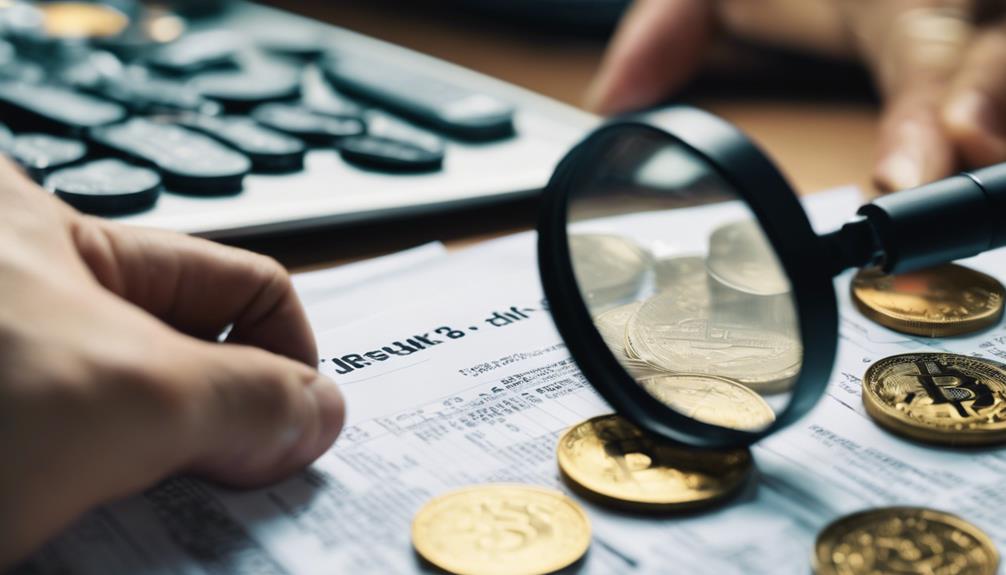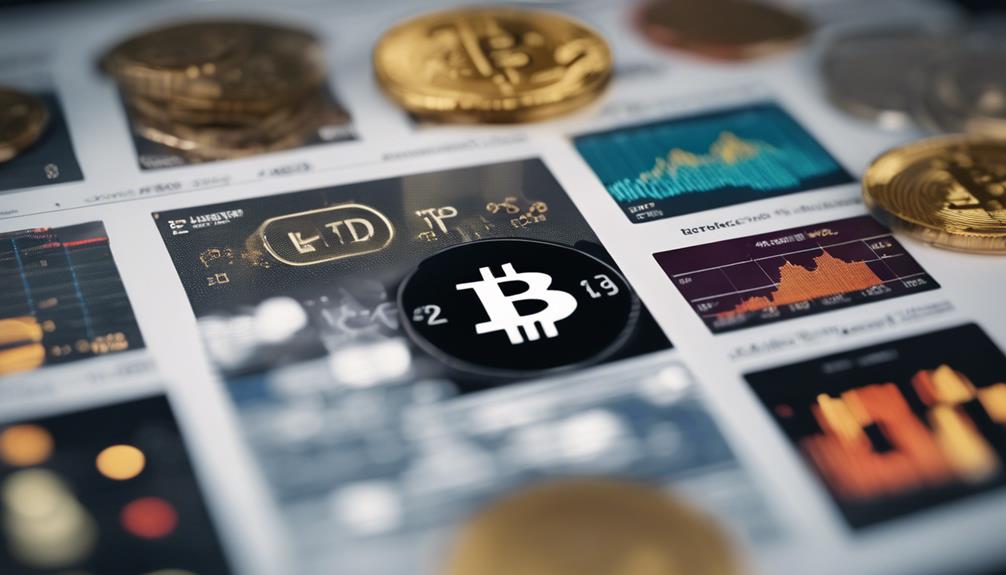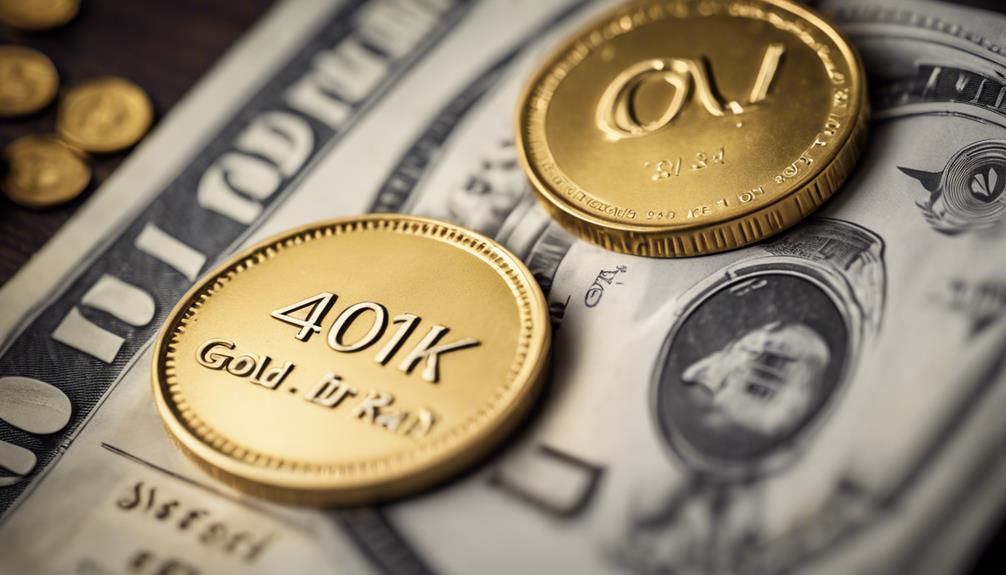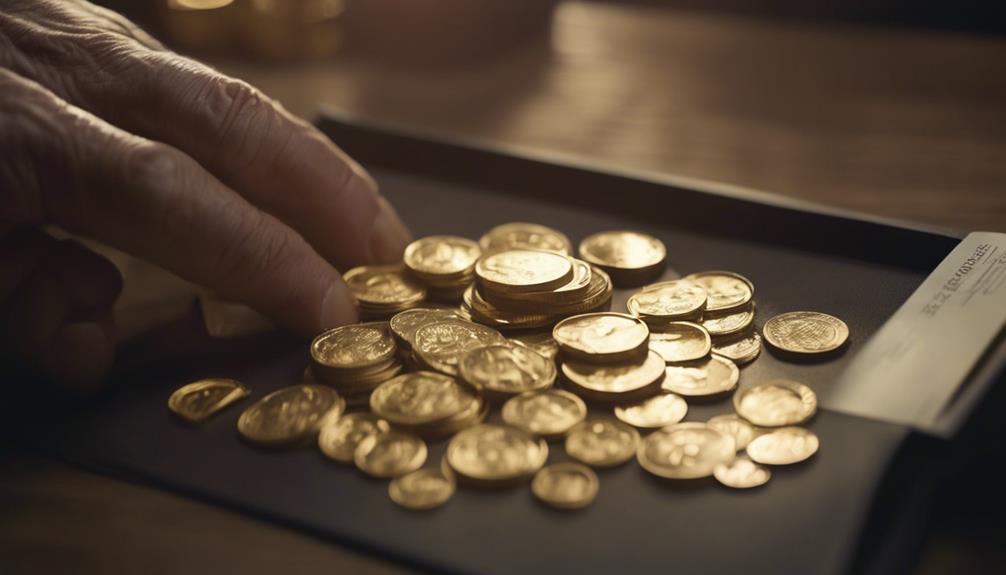Investing in a Digital Currency IRA offers tax-efficient retirement savings with the potential for stable growth. By spreading your investments across digital assets and traditional options, you can take advantage of tax benefits and improved security features. However, it’s important to remain cautious of risks such as price fluctuations, security threats, and compliance issues. Setting up a Digital Currency IRA involves selecting a reputable custodian, completing necessary paperwork, and depositing funds. Diversifying within this type of IRA helps in managing risks and maximizing growth potential. Choosing the right custodian and implementing effective risk management strategies are crucial for achieving long-term success in digital currency IRAs.
Key Takeaways
- Tax-efficient retirement option with growth potential.
- Secure storage and diversified investment opportunities.
- Tax advantages with proper compliance and record-keeping.
- Choose reputable custodians for secure management.
- Strategies include diversification, risk management, and long-term focus.
Benefits of Digital Currency IRAs

Exploring the advantages of Digital Currency IRAs reveals a tax-efficient and secure approach to growing retirement funds. These IRAs offer tax-advantaged growth potential, allowing individuals to invest in digital assets while potentially reducing tax burdens.
Additionally, Digital Currency IRAs provide enhanced security features, ensuring the safe storage of these assets for the long term. Diversification is another key benefit, enabling investors to spread risk across various digital assets and traditional investments.
One of the significant advantages of Digital Currency IRAs is the compounding effect they can have on savings over time. By reinvesting earnings, individuals can benefit from exponential growth, potentially leading to substantial returns in the future.
Furthermore, these IRAs help minimize tax liabilities in the present, offering long-term financial advantages by allowing funds to grow tax-free until retirement. Overall, the IRA benefits include risk reduction, the potential for significant growth, and the opportunity to diversify one's retirement portfolio with digital assets.
Risks Associated With Digital Currency IRAS

Digital Currency IRAs come with inherent risks stemming from the volatile nature of cryptocurrencies and the uncertainties surrounding regulatory environments. These risks include price fluctuations, market downturns, and regulatory changes that can impact the value of digital assets held within the IRA. Security risks such as hacks and cyber attacks on cryptocurrency exchanges pose a threat to the safety of funds stored in these accounts. In addition, compliance risks related to tax reporting, IRS guidelines, and legal consequences can result in penalties if not properly addressed. It is essential for investors to stay informed about the risks associated with digital currency IRAs and take appropriate measures to safeguard their investments.
| Risks | Description | Examples |
|---|---|---|
| Volatility | High price fluctuations in cryptocurrency values affecting IRA balances. | Sudden 20% drop in Bitcoin value. |
| Security risks | Threats like hacks and cyber attacks on exchanges can compromise the safety of funds. | Exchange breach leading to fund theft. |
| Compliance risks | Challenges in adhering to tax reporting requirements and IRS guidelines for digital currencies. | Incorrect tax reporting resulting in penalties. |
Tax Implications for Digital Currency IRAs

When thinking about digital currency IRAs, understanding the tax implications is essential for investors. Tax advantages, reporting requirements, and potential penalties are key points to keep in mind when managing a digital currency IRA.
Tax Advantages Explained
Investments held in digital currency IRAs offer significant tax advantages due to the potential for tax-advantaged growth and the ability to minimize immediate tax liabilities. When considering a digital currency IRA, it's essential to understand the tax implications. The IRS treats digital currencies as property, impacting how they are taxed within IRAs. By utilizing a digital currency IRA, investors can potentially maximize the compounding effect on their investments, leading to accelerated growth over time. Diversifying a retirement portfolio with digital currency IRAs can provide long-term growth opportunities while taking advantage of tax benefits. This strategy not only helps in building a robust retirement fund but also aids in minimizing tax liabilities, ensuring a more secure financial future.
| Tax Advantages of Digital Currency IRAs | ||
|---|---|---|
| Potential for tax-advantaged growth | Minimizing taxes | Diversification |
| Compounding effect | Long-term growth | Property tax implications |
Reporting Requirements Overview
Subject to IRS regulations akin to traditional retirement accounts, the reporting requirements for digital currency IRAs must be meticulously adhered to for accurate tax compliance. The IRS categorizes cryptocurrencies like Bitcoin as property, not currency, impacting tax reporting for digital currency IRAs.
This classification means that reporting requirements include tracking purchases, sales, and gains or losses. Tax implications for digital currency IRAs involve reporting capital gains or losses on annual tax returns. To guarantee compliance, proper record-keeping is essential.
Potential Penalties Outlined
An understanding of the potential penalties associated with digital currency IRAs is essential for investors seeking to navigate the tax implications of these retirement accounts effectively.
Early withdrawals from Digital Currency IRAs before age 59 1/2 may incur a 10% penalty. Contributions to a Roth Digital Currency IRA are taxed upfront but can be withdrawn tax-free.
Traditional Digital Currency IRAs require mandatory distributions starting at age 72, subject to ordinary income tax. Converting a Traditional Digital Currency IRA to a Roth IRA incurs taxes on the converted amount.
Failure to meet IRS rules on Digital Currency IRAs can result in penalties and tax liabilities. It's important for investors to be aware of these consequences to make informed decisions and avoid unnecessary financial setbacks.
How to Open a Digital Currency IRA

To establish a Digital Currency IRA, the initial step involves selecting a reputable custodian or platform that provides digital currency investment options. Make sure that the chosen custodian supports the specific cryptocurrencies you wish to include in your IRA. Complete the necessary paperwork and provide personal information to establish your digital currency IRA account. Next, fund your digital currency IRA by transferring funds or rolling over funds from existing retirement accounts. Once your account is funded, it is crucial to monitor and manage your digital currency investments within the IRA according to your financial goals and risk tolerance.
| Steps to Open a Digital Currency IRA | |||
|---|---|---|---|
| Step | Description | Action Required | Completion Time |
| Select a Custodian | Choose a reputable custodian offering digital currency options | Research and compare | 1-2 weeks |
| Verify Cryptocurrency Support | Confirm custodian supports desired cryptocurrencies | Check custodian's list | 1-2 days |
| Complete Paperwork | Fill out necessary forms and provide personal information | Submit required documents | 2-3 days |
| Fund the Account | Transfer or roll over funds into the digital currency IRA | Initiate transfer process | 1-2 weeks |
Diversification in Digital Currency IRAs

Diversification in Digital Currency IRAs allows investors to strategically blend cryptocurrencies with traditional assets to create a balanced portfolio that leverages the growth potential of the cryptocurrency market while managing risks associated with traditional investments. By including digital currencies like Bitcoin, Ethereum, and Litecoin in Roth IRAs or Traditional IRAs, individuals can diversify their retirement portfolios effectively.
This diversification helps in mitigating risks linked to traditional market fluctuations, offering a more stable approach to wealth accumulation over time. Holding a mix of digital currencies and traditional investments within a Crypto IRA can provide a well-rounded strategy for investors, enabling them to tap into the growth potential of the cryptocurrency market while also hedging against risks associated with traditional assets.
Diversifying with digital currencies in IRAs can be a prudent way to navigate the evolving landscape of investment opportunities and secure a more robust financial future.
Choosing a Custodian for Digital Currency IRAs

How important is selecting a reputable custodian when establishing a Digital Currency IRA? Choosing the right custodian is paramount in guaranteeing the security and compliance of your digital currency assets within an IRA.
Here are five key considerations when selecting an IRA custodian for your digital currency investments:
- IRS-Approved: Guarantee the custodian is IRS-approved to handle digital currency IRAs to comply with regulations.
- Secure Storage: Look for custodians offering secure storage solutions to safeguard your digital assets.
- Buying, Selling, Trading: The custodian should facilitate seamless buying, selling, and trading of digital currencies within the IRA.
- Compliance: Choose a custodian well-versed in IRS regulations to ensure compliance and avoid penalties.
- Administrative Tasks and Record-Keeping: Select a custodian capable of handling administrative tasks and maintaining accurate record-keeping for your digital currency IRA.
Strategies for Investing in Digital Currency IRAs

When considering strategies for investing in digital currency IRAs, it's important to prioritize diversification to spread risk across different assets.
Risk management strategies play a vital role in safeguarding investments and ensuring long-term growth potential.
Understanding the long-term investment possibilities of digital currency IRAs can help individuals make informed decisions for their retirement portfolios.
Diversification in Digital IRAS
Utilizing a well-thought-out allocation strategy is crucial in maximizing the potential benefits of diversifying investments within digital currency IRAs. When considering diversification in digital currency IRAs, investors should keep in mind the following strategies:
- Allocate investments across a mix of cryptocurrencies like Bitcoin, Ethereum, Ripple, Litecoin, and Bitcoin Cash.
- Spread funds based on market trends to capitalize on potential growth opportunities.
- Consider risk tolerance when determining the allocation of assets within the digital currency IRA.
- Align diversification strategies with long-term investment goals to guarantee consistency in portfolio performance.
- Regularly review and adjust diversification approaches to adapt to changing market conditions and optimize investment returns.
Risk Management Strategies
In the domain of digital currency IRAs, implementing effective risk management strategies is vital to safeguarding investments and optimizing potential returns.
Diversifying your digital currency IRA portfolio can help mitigate risk and maximize potential returns. Utilizing dollar-cost averaging reduces the impact of market volatility on your investments, while employing stop-loss orders automatically sells assets at a predetermined price to limit losses.
It's essential to regularly review and adjust your risk tolerance and investment strategy to align with financial goals. Staying informed about market trends, regulatory changes, and security measures enables proactive risk management in your digital currency IRA.
Long-Term Investment Potential
Driven by the growth and adoption of cryptocurrencies like Bitcoin and Ethereum, the long-term investment potential in digital currency IRAs offers investors opportunities to diversify and hedge against traditional market volatility. Considering the dynamic nature of the digital currency market, it is essential to strategize investments wisely.
- Diversification is vital for long-term success.
- Using digital currency IRAs as a hedge against volatility.
- Implementing dollar-cost averaging to mitigate price fluctuations.
- Staying informed about market trends and developments.
- Making informed decisions based on thorough research.
Frequently Asked Questions
What Is a Digital Ira?
A digital IRA is a self-directed retirement account that allows investors to hold digital assets like cryptocurrencies. This investment vehicle enables individuals to invest in digital currencies within a tax-advantaged framework.
Digital IRAs offer diversification by including cryptocurrencies such as Bitcoin and Ethereum. With a custodian overseeing compliance with IRS retirement savings regulations, investors can benefit from the growth potential of digital assets while enjoying tax advantages.
How Does a Crypto IRA Work?
A Crypto IRA operates by enabling individuals to allocate their retirement funds into various cryptocurrencies, functioning as a self-directed IRA tailored for digital assets. Investors can combine traditional investments with cryptocurrencies in this specialized retirement account. This unique approach provides diversification opportunities, allowing investors to balance the volatility of cryptocurrencies with the stability of traditional assets. The process behind this type of investment can vary, but the basics of how a bitcoin IRA work explained involve setting up a self-directed account through a custodian that facilitates cryptocurrency investments. From there, individuals can choose their preferred digital assets, like Bitcoin or Ethereum, to grow their retirement portfolio.
Custodians oversee self-directed accounts, facilitating investments in virtual currencies. While Crypto IRAs offer diversification benefits, they also come with high risks and additional costs due to the considerable price volatility associated with digital assets.
How Do You Explain Cryptocurrency to a Beginner?
Cryptocurrency is a type of digital currency that uses cryptography for security. It operates independently of a central authority, like a bank, and transactions are recorded on a public ledger called a blockchain. Popular cryptocurrencies include Bitcoin, Ethereum, and Litecoin.
Beginners can think of cryptocurrency as digital money that can be used for online purchases or investments. It's essential to research and understand the market before investing in cryptocurrencies for beginners.
How Does Digital Currency Work?
Digital currency operates on decentralized blockchain technology, enabling peer-to-peer transactions without the need for intermediaries like banks. Transactions are verified by network participants through cryptography, ensuring security and transparency.
Each digital currency has unique properties and uses, such as Bitcoin for peer-to-peer payments and Ethereum for smart contracts. Digital currencies work by leveraging blockchain to record and validate transactions securely across a distributed network.
Conclusion
To sum up, investing in a Digital Currency IRA can offer benefits such as potential growth and diversification, but it also comes with risks and tax implications.
It is important to choose a reputable custodian and consider various strategies for investing.
Just as a skilled sailor navigates the unpredictable waters with caution and strategy, investors must carefully navigate the digital currency market to secure their retirement savings.









